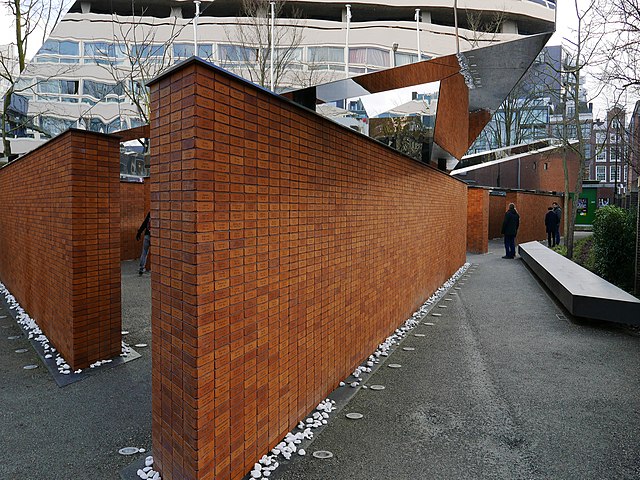Anti-Semitism in the Netherlands: lessons from the Holocaust
Senay Boztas
The new right-wing Dutch government wants to make sure that everyone who does an integration course in the Netherlands learns about the Holocaust and its victims.
When asked to explain why, housing minister Mona Keijzer caused outrage when she claimed on a chat show earlier this year that “anti-Semitism is almost part of the Islamic culture” in some countries.
Only last week, the Dutch parliament voted for a motion for the government to “keep details about the cultural and religious norms and values of Dutch people with a migration background.”
For some, this title sparked memories of the Nazi occupation when Jewish people were invited to register with their council. It was a prelude to the horror of the Final Solution, an attempt to murder them all.
These recent controversies stress the importance of understanding what happened during the Holocaust in the Netherlands.
Nobody who has seen the map produced by Amsterdam civil servants for the Nazis, every dot representing 10 Jewish lives, would think that it was okay to give the impression that people would be asked to have their religion recorded again.
The MP who wrote the motion later said that she was misunderstood and the prime minister has also said there will be no such register. But the very fact that the motion was drawn up and voted on highlights the need for more education about the Holocaust, for everyone.
People who come from other countries, including places in conflict with Israel, also need to understand the Western prototype of genocide and the way that the Netherlands helped, looked away or – in the rarer cases – resisted.
Complicity
In the Nazi-occupied Netherlands, three-quarters of the Jewish population was murdered with the complicity of the state. Trams and trains profited from transports of Jewish people.
Some Dutch people went around shopping for free possessions or even a free house when Jewish people had been rounded up to be murdered. And the few Jewish survivors of the Holocaust too often came back to neighbours who did not want to give back what they had taken. If they still had a home, they were charged housing tax for their time imprisoned in German camps.
Amsterdam, the Dutch Protestant church and king, rightly, apologised in more recent times for this record. Reports on the complicity and anti-Semitism of Amsterdam, Zwolle, Rotterdam and others are being researched. And when it was revealed by a recent NIOD report that in psychiatric care, Dutch patients were protected but Jewish ones weren’t, the pattern became even more clear.
People in other countries, who have little idea that many of the Dutch did not mirror their tolerant, Christian, rights-respecting image during the Nazi occupation, need to learn the facts.
“Bad Dutch”
During the Holocaust, around 102,000 Jewish people, and around 220 Roma and Sinti were murdered by the Nazis. It was the worst record in Western Europe. In 2025, archives will open to researchers about those Dutch people accused of complicity – with all kinds of photographs, diary entries, medical records and court documents.
This thought horrifies some relatives, even though documents are often accusations, many ended in nothing, and there are as many questions as answers. It is considered so sensitive – unlike, initially, the religion or cultural beliefs of ethnic minorities – that this archive of “bad Dutch” will not go online as planned due to privacy concerns.
Only this year, 80 years after the war, was the country able to open a Holocaust Museum and memorial site telling more of the painful story, alongside some of the admirable instances of bravery and rescue. Everyone, immigrants and MPs alike, should go to it, however close these war wounds are to the surface. It is important not to judge, but to know.
Norms and values
That said, by the time you’ve finished a Dutch integration course on the Holocaust, it might be 50:50 whether you want to leave again (especially when you add the modules on slavery, plus modern-day chapters on money laundering and fraud, Groningen and the childcare benefits scandal).
In the heat of their anti-immigration rhetoric, some Dutch politicians clearly do not want to accept that their country will soon be in an international battle for talented labour – whether that’s to build a house or produce complex chips.
If you’re an immigrant with the skills the Netherlands needs, with its ageing population and workshy youth, you have a choice of jobs. There are places where the sun shines, the language is beautiful and housing is more affordable.
So, please, teach everyone about the Holocaust. It is a lesson in what happens when the rule of law is crushed, decent people are silent and one group is blamed for all of society’s ills. This painful history is a vital part of the debate on Dutch “norms and values”.
Thank you for donating to DutchNews.nl.
We could not provide the Dutch News service, and keep it free of charge, without the generous support of our readers. Your donations allow us to report on issues you tell us matter, and provide you with a summary of the most important Dutch news each day.
Make a donation